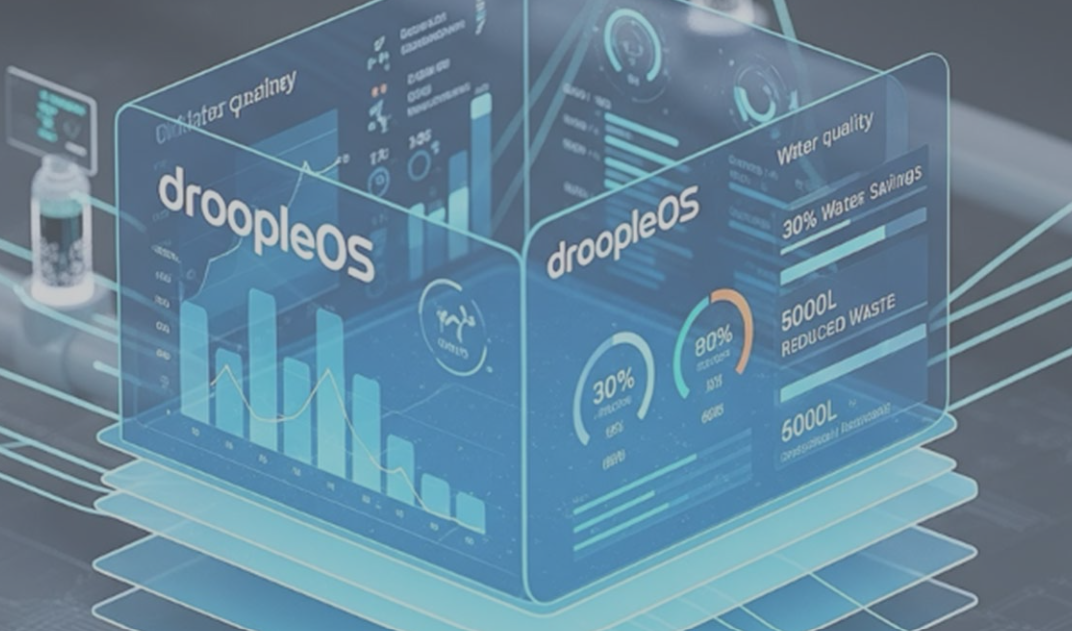Switzerland does not give itself the means to better manage its water
by Ramzi Bouzerda, founder and CEO of Droople

Europe, including Switzerland, have not experienced this much drought in 500 years. In France, more than 100 municipalities are deprived of water, while in Switzerland I am one of those who have received a notice of restrictions on use (without any coercion or monitoring) such as filling swimming pools or washing cars. Cattle breeders meanwhile have to transport water (by truck or helicopter) from the lakes to the mountain pastures so that our cows can drink this critical nutrient, at the expense of unnecessary greenhouse gas emissions.
I am going to list three examples among many others which, at the very least, allow me to legitimize my assertion.
1. FAR FROM FAIR
Unfortunately, not all blue gold users are equal. In fact, agriculture consumes 20% of the water produced. This proportion doubles in summer months during water shortage. The industrial sector uses 55% and households only consume 25%. The contribution of each proportionally to the costs of their water infrastructure, either via tariffs or via taxes, is notat all aligned according to their use. Households pay a high price for access to drinking water. Agriculture is heavily subsidized and can draw from groundwater or surface water almost free of charge. Industrial factories (paying for pumping electricity) pay for its net consumption, but does not pay for the surface water it uses to cool throughout processes, as an example. We are therefore far from fair pay-per-use scheme.
2. DATA FOR POLLUTION
At the end of June, the Parliamentary Audit Commission declared that measures to combat water pollution from agricultural sources fell short of its expectations. The Federal Office for the Environment has particularly been asked to be more active and consistent in its approach to protecting groundwater. In particular, they urged the Federal Council to apply more consistent sanctions against polluters and to demand better data from the cantons. Those who have traceable data on the simple level of groundwater can be counted as few as the fingers of one hand.
3. EVENLY SPLIT?
Water billing in rental properties is a huge problem. For decades, we have paid for our electricity according to our consumption because each apartment has an individual meter. For water, we mainly apply the surface-based scheme, known as proportional to the surface of the residence. As a result, two-thirds of the tenants who use less water pay for the one-thirds who use more. Here too, the pay-per-use principle would allow an average reduction of 20% in overall consumption. In times of an energy crisis where 30% of the water used is hot (10 CHF / cubic meter of hot water, versus 1.50 CHF / cubic meter), that would be good for our oil bill, wouldn't it?
Switzerland believes that its water reserves are inexhaustible, while in contrast our glaciers, our water batteries, have lost 50% of their volume from 1931 to 2016. Water is energy, energy is not water. Our renewable electricity production will take a hit. Quantity and quality are two sides of the same challenge. Our country also has a persistent problem of groundwater pollution from agriculture combined with a lack of data needed to make good decisions. When leadership is needed, our politicians are lax in enforcing sustainable regulations.
French version in Agefi published August 30, 2022

Login at https://app.droople.com with the credentials you received. Welcome to your Water Intelligence Platform!
All Gateways are using a LoRa network, but we will discuss together the technical specificities of the place you are equipping to adapt our offer between a 4G, Wifi or Ethernet gateway. More on our Support page
You can find help here.
For more, visit the Droople Support page to access the DIY videos and Quick Start Guides based on your product.
Each Droople iLink has a unique QR Code. Scanning takes you to configure it to a new or existing "asset". After configuration and use of your tap, you already have access to your metrics. For detailed instructions, you can find videos and tutorials on our Support page: https://droople.readme.io/
Our Support page can be found here https://droople.readme.io.
Our Technical Specifications here.
If you need any other assistance, please contact us here






